 Petzlover
Petzlover Birman is originated from France but Savannah is originated from United States. Both Birman and Savannah are having almost same weight. Birman may live 5 years less than Savannah. Both Birman and Savannah has same litter size. Birman requires Moderate Maintenance. But Savannah requires Low Maintenance
Birman is originated from France but Savannah is originated from United States. Both Birman and Savannah are having almost same weight. Birman may live 5 years less than Savannah. Both Birman and Savannah has same litter size. Birman requires Moderate Maintenance. But Savannah requires Low Maintenance
 There isn’t clarity as to this exquisite cat’s origins. Many people believe they originated as the companions of temple priests in northern Burma.
There isn’t clarity as to this exquisite cat’s origins. Many people believe they originated as the companions of temple priests in northern Burma.
The cats somehow found their way to France, and it is believed that they have been in France since the 1920s.
The cats nearly disappeared during World War II, but luckily the remaining Birmans that survived were crossed with Siamese and Persians to strengthen the breed. In the early 1950s, pure Birnam litters were produced. It was in about 1959 that Birmans were brought to the United States.
The cats were also recognized in Britain in 1965 and in 1966 by the CFA. The first Birman cats were seal point but later other colors were brought in such as red, chocolate, and tabby.
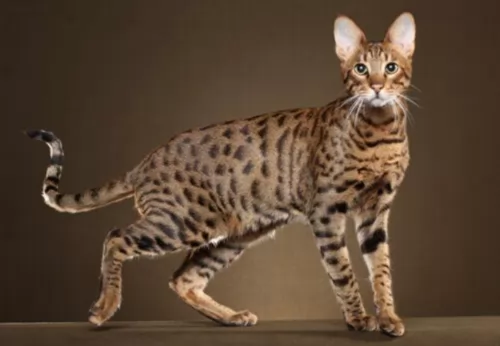 Savannah cats have been bred to look like a Serval but it is essentially a domestic cat. The first Savannah cat was born in the United States in April 1986. The person who was successful in making this happen was Judee Frank.
Savannah cats have been bred to look like a Serval but it is essentially a domestic cat. The first Savannah cat was born in the United States in April 1986. The person who was successful in making this happen was Judee Frank.
She bred a Serval wild cat and a Siamese cat and they produced a female kitten with the name of Savannah – named after the African savannas from where the serval cat comes from.
It will take your Savannah kitten about 3 years to reach his adult size. The Savannah will give birth to up to 6 kittens. The cat was recognized by TICA in 2001.
Today when you’re looking to buy a Savannah kitten, you’ll notice the cats are always described with a filial number, for example, F1, F2, F3, F4, and so on. The filial number describes the generation a cat comes from.
Because this cat belongs to a hybrid group, the feline is banned in a number of states and cities in the United States of America.
 These are medium-sized cats which can become fairly large. They can weigh up to 4, 5 or 6kg. They are fairly heavily boned with a broad face and ears that are widely spaced.
These are medium-sized cats which can become fairly large. They can weigh up to 4, 5 or 6kg. They are fairly heavily boned with a broad face and ears that are widely spaced.
The round eyes are deep blue. The cat’s fur is medium-long and should be silky to the touch with no undercoat. Ther cat is a moderate shedder.
The base color is whitish to cream, but the kittens are always born white. Coat color, whether red, cream, or chocolate is always pointed and the cat always has the white paws.
The Birman isn’t as outgoing as some of the other cat breeds and its a quiet, docile intelligent cat that attaches itself to one particular family member. They can actually become jealous of their human companion and demand their attention.
These friendly cats are wonderful choices for families with children and dogs. They are calm and affectionate, and softly spoken, quietly letting you know when it’s dinner time and enjoying just being around his human family.
He is able to get along well with kids and other pets in the home. He can become quite playful too and because he is so intelligent, you can buy him some toys that require him to think.
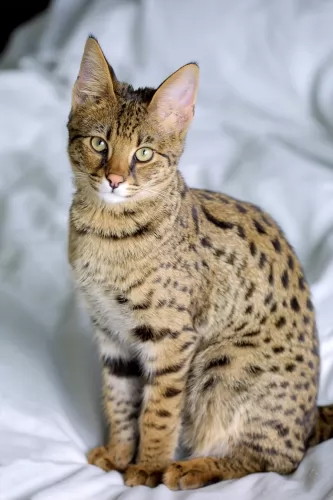 The Savannah Cat is a fairly large cat that weighs anything from 3 to 8 kg. It is a cross between a domestic cat and one of Africa’s smaller wild cats, the Serval.
The Savannah Cat is a fairly large cat that weighs anything from 3 to 8 kg. It is a cross between a domestic cat and one of Africa’s smaller wild cats, the Serval.
Because of the Serval in the mix, the Savannah cat is able to leap into the air too because of his long legs. The cat has a short tail, and similar to the Cheetah has tear markings running from the corner of the eyes down to the whiskers.
A striking feature of this cat is his hooded eyes and the large ears. The Savannah cat has exotic looks and is regarded as a low maintenance cat with its short fur. The coat is tawny-colored with black spots but it comes in 4 background colors – smoke, silver, brown, and black.
An interesting aspect with the Savannah Cat is that they are sometimes compared to dogs. They become loyal pets and companions and will follow their owners around and can even be trained to walk on a leash.
The Savannah is an intelligent cat and can be taught a trick or two. Because the Savannah cat is a hybrid, they aren’t predictable in nature. Some are friendly and social while others are more wild and hostile. Some of them don’t like meeting strangers and will growl and hiss with uncertainty.
They enjoy playing in water and it will be a good idea to invest in a paddling pool for this cat’s outdoor enclosure. It’s an active cat and will require daily exercise. It is better suited to homes where there are older children.
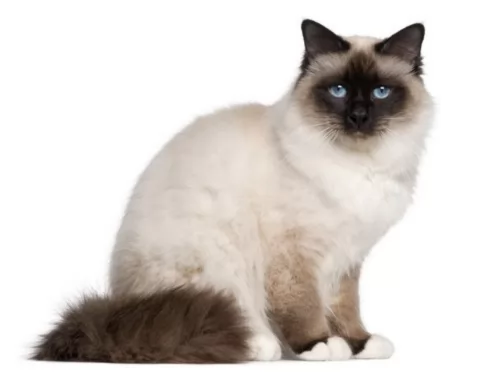 The Birman cat has to be one of the most beautiful cats there are, but the cat isn’t only a beautiful cat, it has wonderful characteristics as well.
The Birman cat has to be one of the most beautiful cats there are, but the cat isn’t only a beautiful cat, it has wonderful characteristics as well.
It is a loving, affectionate cat with his human family, loving to spend time around them. Playful and healthy, when you bring this most wonderful cat into your home, it will be as though an angel has come to stay.
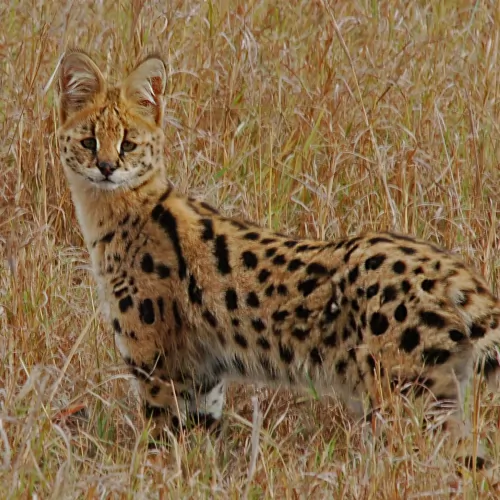 The Savannah cat's temperament is exceptional, and when you’ve got a Savannah in your home, you’ve got a true companion.
The Savannah cat's temperament is exceptional, and when you’ve got a Savannah in your home, you’ve got a true companion.
Cat lovers who have owned one of these cats will tell you that this cat is similar to a dog in many ways. The intelligent cat will follow his owners around and be a friendly, loyal, and devoted companion.
With so much intelligence, beauty, and energy, this cat has all the qualities of a splendid feline companion.
The Savannah will form a particularly strong bond with the human family member who grooms and feeds him.
Everybody who has known the social, affectionate, loyal cat has nothing but good words to say and he may just be the cat companion you want.
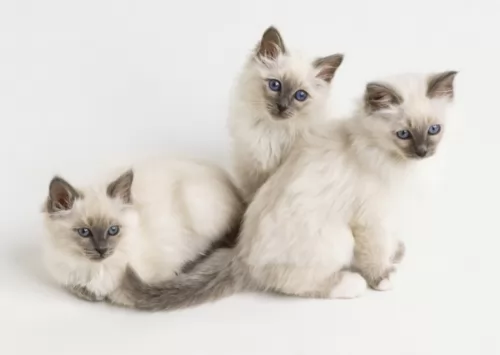 With good health your Birman can reach up to 13 years of age. With the Birman, the most serious illness is feline hypertrophic cardiomyopathy which also happens to be the most common heart disease in cats.
With good health your Birman can reach up to 13 years of age. With the Birman, the most serious illness is feline hypertrophic cardiomyopathy which also happens to be the most common heart disease in cats.
It’s a progressive disease and can result in heart failure. The cats are also at risk of developing feline infectious peritonitis.
Also, because this is a larger cat and a stocky kind of breed, it can easily put on weight and then become overweight. Strict attention will need to be given to diet as well as daily exercise.
Also, look out for Corneal dermoid - skin and hair on the surface of the cornea in one eye or in both. Luckily this is an eye problem that can be surgically corrected.
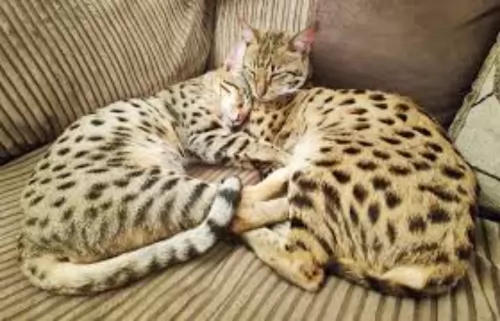 The Savannah is generally a healthy cat. The cat can also fall prey to some of the typical cat illnesses there are -
The Savannah is generally a healthy cat. The cat can also fall prey to some of the typical cat illnesses there are -
Allergies happen with cats when their immune systems become sensitive to certain things. Cat allergies can be environmental, from fleas or from food allergies.
While some allergies may come and go, others will require an examination by the vet as they can include itchy skin problems. Typical allergy symptoms include sneezing and coughing, runny eyes, diarrhea and vomiting.
This is a gastrointestinal disorder. Cats of any age are affected but it is found more in older cats. Chronic inflammation of the gastrointestinal tract can come about because of a food allergy for instance or parasitic or bacterial infection. Your Savannah cat will be vomiting and lethargic and have diarrhea and weight loss.
These are parasites that invade the small intestines of a cat. It can cause anemia and inflammation of the small intestine. Hookworms can produce symptoms such as weight loss, coughing, and diarrhea as well as skin irritations.
This condition causes thickening of the muscular walls of a cat’s heart. The heart’s left ventricle is thickened. The heart can beat rapidly and this results in more oxygen usage. It can also lead to oxygen starvation which causes heart cells to die off. A condition known as arrhythmia develops where the heart beats irregularly.
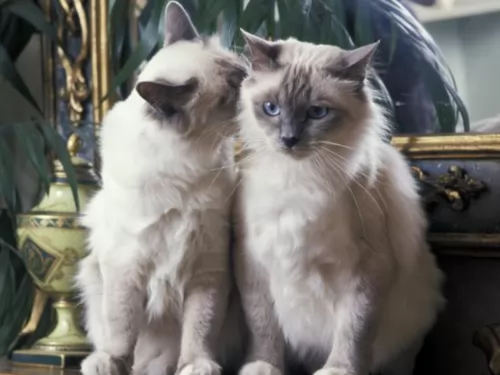 The Birman has a silky coat that sheds moderately so you want to give him a gentle brush once or twice a week to keep the coat of his soft and silky.
The Birman has a silky coat that sheds moderately so you want to give him a gentle brush once or twice a week to keep the coat of his soft and silky.
The Birman has a full topcoat, with no undercoat which means that you won’t have the coat matting or tangling.
He’ll need his nails trimmed and his teeth checked regularly. Your vet or professional groomers can do this for you and clean his teeth and check that there are no bad teeth making your pet sick.
The Birman cat has access to some great commercial cat food as there are some seriously good quality ones.
Many cat lovers choose cat foods that are AAFCO (Association of American Feed Control Officials) approved. It at least provides minimum standards for pet foods.
For your Birman you want to avoid artificial flavors and preservatives. Choose quality foods high in meat protein. As a carnivore, a cat has a huge need for meat protein. Get to know your pet food labels and choose foods with added taurine and vitamin A.
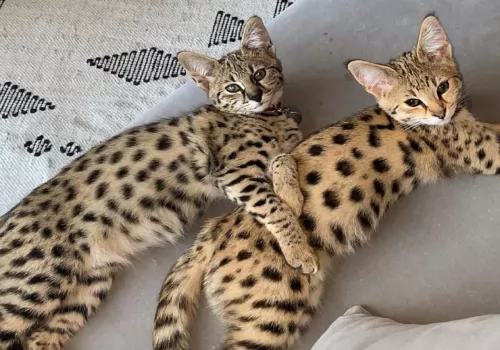 The Savannah cat's diet needs to be a high-quality type of food with efficient levels of protein and taurine. The reason for this is that all cats are carnivores. A properly balanced raw diet will be the best nutritionally balanced food you can provide.
The Savannah cat's diet needs to be a high-quality type of food with efficient levels of protein and taurine. The reason for this is that all cats are carnivores. A properly balanced raw diet will be the best nutritionally balanced food you can provide.
The Savannah has a short coat, which makes him low maintenance. He will still need to be brushed once a week. This will ensure a healthy sheen, and it will remove loose hairs and dust.
Provide for this intelligent cat’s physical and mental stimulation. He will need a variety of interactive toys. You yourself, need to become involved with your feline friend and give him a game too.
Make sure your Savannah is up-to-date with all his vaccinations. If you’re in any doubt about your pet’s health and wellbeing, get him to the vet who can provide you with valuable information on his health and his diet to ensure optimal health for your feline friend.